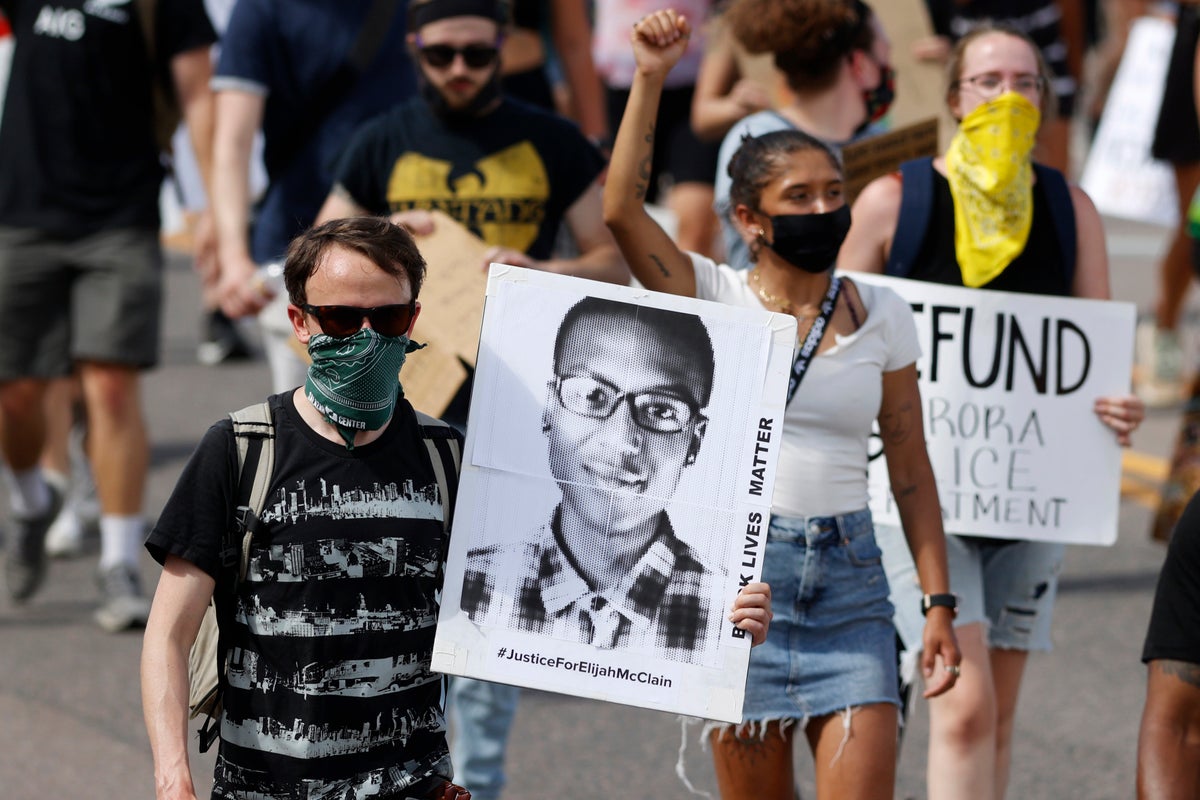
A verdict is looming in the trial of two Colorado police officers charged over the 2019 death of Elijah McClain – a Black man who was put in a neck hold and pinned down by officers before paramedics injected him with a powerful sedative.
Aurora Police officers Randy Roedema and Jason Rosenblatt are facing several charges including reckless manslaughter in the case.
Following almost three weeks of testimony, jurors began deliberations at around 4.30pm on Tuesday afternoon before they were dismissed just 30 minutes later.
They will resume deliberations on Wednesday morning.
Prosecutors and the defence delivered closing statements earlier on Tuesday with the state arguing that the officers used excessive force and failed to follow their law enforcement training.
“They were trained. They were told what to do. They were given instructions. They had opportunities, and they failed to choose to de-esclate violence when they needed to, they failed to listen to Mr McClain when they needed to, and they failed Mr McClain,” prosecutor Duane Lyons told jurors.
The defence, meanwhile, argued that the fault lay with the paramedics for injecting McClain with a fatal dose of ketamine.
Back on 24 August 2019, McClain was stopped while walking home from a convenience store on a summer night, listening to music and wearing a mask that covered most of his face.
A 911 caller reported him as suspicious and the police stop quickly became physical with McClain, a 23-year-old massage therapist seemingly caught off guard, asking to be left alone.
He had not been accused of committing any crime.
Prosecution witnesses testified that the sedative ketamine killed McClain. But prosecutors also offered medical testimony that the restraint of McClain by Aurora officers Roedema and Rosenblatt triggered a series of health problems that made it hard for McClain to breathe and more vulnerable to a fatal overdose.
Defence attorneys did not call any witnesses, instead using questions for prosecution witnesses to make their case that the officers did not cause McClain’s death.
Protester holds image of Elijah McClain— (Copyright 2020 The Associated Press. All rights reserved.)
Mr Roedema and Rosenblatt are charged with manslaughter, criminally negligent homicide and second-degree assault – all felonies. An assault conviction carries the most serious penalty, up to 16 years in prison.
Officer Nathan Woodyard – whose trial starts Friday – was the first to stop McClain.
Within 10 seconds, Mr Woodyard put his hands on McClain and turned him around. As McClain tried to escape his grip, Mr Woodyard said: “Relax, or I’m going to have to change this situation.”
The encounter quickly escalated, with the three officers taking McClain to the ground and Woodyard putting him in a neck hold by pressing against his carotid artery, temporarily rendering him unconscious. The officers later told investigators they took McClain down after hearing Mr Roedema say, “He grabbed your gun dude.”
This moment can be heard but not seen on body camera video. The extensive video of the moments leading to his death were shown repeatedly to jurors.
Two paramedics, Jeremy Cooper and Peter Cichuniec, were also charged in McClain's death and are scheduled to go on trial in November.
The local district attorney did not pursue criminal charges in 2019, but the case was re-examined in 2020 after Governor Jared Polis asked state Attorney General Philip Weiser to investigate amid protests over police brutality against Black people following the murder of George Floyd in Minneapolis.
Mr Roedema and Mr Woodyard are currently suspended without pay. Mr Rosenblatt is the only officer involved in the incident who was fired – not for the fatal encounter itself, but for making light of other officers’ reenactment of the neck hold.
The Associated Press contributed to this report







